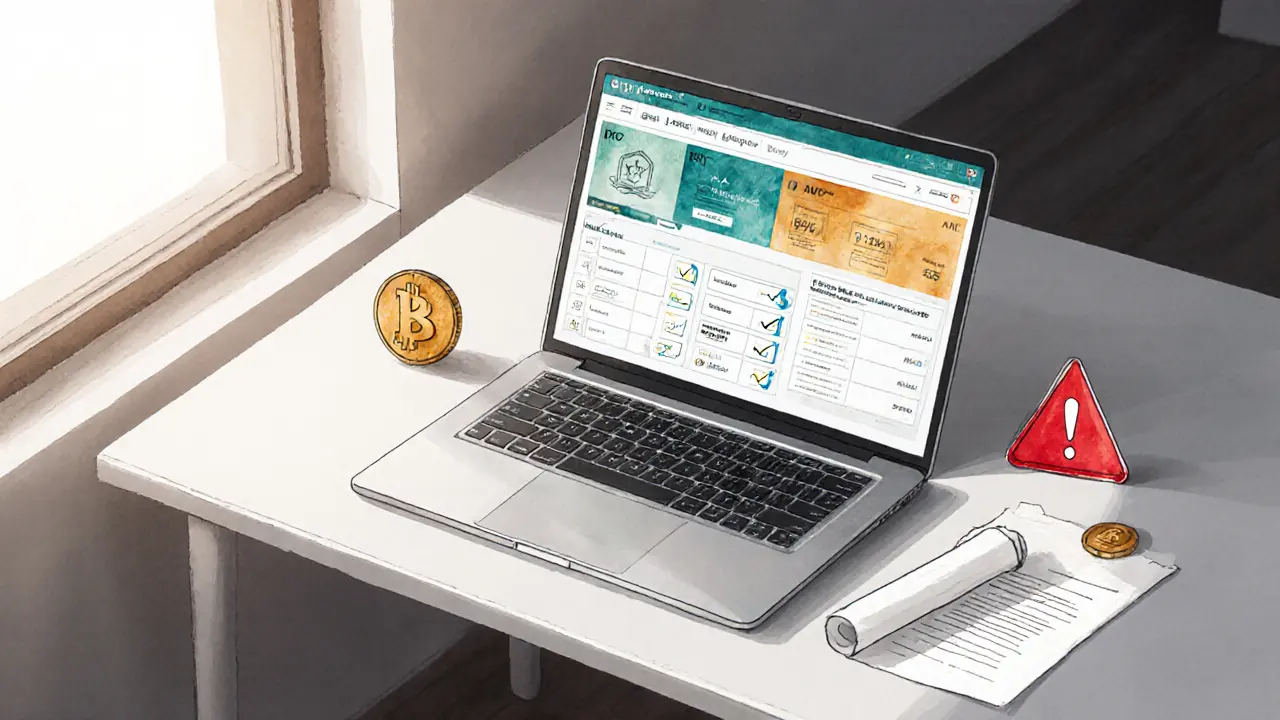Morocco Crypto FX Violation Penalty Calculator
Calculate Potential Penalties
Select the type of offender and the nature of the violation to determine potential fines and consequences.
Penalty Result
When it comes to digital assets, Morocco walks a tight‑rope between outright bans and careful supervision. The country treats any crypto activity that sidesteps official channels as a breach of its foreign‑exchange controls. Below is a plain‑language guide that tells you what the law looks like today, how penalties are calculated, and what you need to do to stay on the right side of the regulator.
TL;DR - Quick Takeaways
- Crypto trading is only legal on platforms licensed by Bank Al-Maghrib.
- Unlicensed trading can cost individuals MAD20,000‑100,000 and firms up to MAD500,000.
- Mining, commercial crypto payments, and cross‑border crypto settlements remain prohibited.
- All platforms must follow AML/CFT rules, perform KYC, and pay a 15% capital‑gains tax.
- Repeat offenses may trigger criminal proceedings.
Understanding Morocco cryptocurrency regulation is essential for anyone wanting to buy, sell, or run a crypto‑related business in the Kingdom.
Background: From Total Ban to Limited Legalisation
Morocco entered the crypto arena in November2017 with a sweeping prohibition. The ban was driven by concerns that digital‑currency transactions bypassed the country’s long‑standing foreign‑exchange controls, which date back to independence. The central bank, Bank Al-Maghrib, teamed up with the Foreign Exchange Office to treat any crypto use as a direct violation of those controls.
From 2017 through 2024, enforcement focused on shutting down peer‑to‑peer (P2P) groups and seizing hardware used for mining. Despite the crackdown, a resilient community kept trading on underground OTC desks, prompting the regulator to rethink a blanket ban.
2024‑2025 Shift: Draft Law to Full Framework
In early2024, Governor Abdellatif Jouahri announced at the African Central Bank summit that Morocco had finished drafting a law to legalise and supervise crypto activities. By 2025 the draft became law, introducing three core pillars:
- Consumer protection - mandatory licensing, disclosure, and dispute‑resolution mechanisms.
- Anti‑money‑laundering (AML) and counter‑terrorism financing (CFT) - full alignment with international standards.
- Market integrity - reporting obligations, capital‑gains taxation, and oversight of token offerings.
The new framework still bars crypto from being used for commercial payments or international settlements. Businesses must use traditional banking channels for cross‑border trade, preserving the central bank’s ability to monitor foreign‑exchange flows.
Licensing & Compliance Requirements
To operate legally, a crypto platform must secure a licence from Bank Al-Maghrib. The licence dossier includes:
- Proof of adequate capital and insurance.
- Detailed AML/CFT policies that meet the criteria set by the Anti‑Money‑Laundering and Countering the Financing of Terrorism regulations.
- Technical security audits covering custody, encryption, and transaction monitoring.
- Mandatory Know‑Your‑Customer (KYC) procedures for every user.
Once licensed, platforms must file daily transaction reports, flag suspicious activity, and remit a 15% capital‑gains tax on any profit generated by Moroccan residents.
Token sales (ICOs) also fall under the jurisdiction of the Moroccan Capital Market Authority (AMMC). The AMMC reviews prospectuses, ensures investor disclosures, and checks that the token does not qualify as a security without proper registration.

Penalties for Foreign‑Exchange Violations
Violations are classified by the offender’s status and the severity of the breach. The following table summarises the financial sanctions in force as of October2025:
| Offender Type | Violation | Fine (MAD) | Additional Consequences |
|---|---|---|---|
| Individual | Unlicensed trading or use for cross‑border payments | 20,000 - 100,000 | Possible criminal prosecution on repeat offenses |
| Corporate Entity | Operating an unlicensed platform or facilitating illegal FX | Up to 500,000 | License revocation, court action, and asset seizure |
| Mining Operation | Any mining activity (still illegal) | 100,000 - 250,000 per site | Equipment confiscation, criminal charges |
Beyond the monetary fines, authorities can impose travel bans, freeze bank accounts, and require public disclosure of the violation.
What Remains Prohibited
- Crypto mining - The ban persists because mining often involves imported hardware and electricity, both of which could trigger untracked capital outflows.
- Commercial crypto payments - Businesses cannot settle invoices or wages in digital assets; they must convert to Moroccan dirhams (MAD) through licensed banks.
- Cross‑border crypto settlements - International trade must go through the conventional foreign‑exchange system, not directly via blockchain.
Violating any of these rules exposes you to the penalties listed above and, in severe cases, criminal prosecution.
Practical Tips for Users and Businesses
- Only trade on platforms that display a licence number issued by Bank Al-Maghrib. The licence is usually listed in the site’s footer.
- Complete KYC with valid national ID, proof of address, and source‑of‑funds documentation. Keep copies for at least three years.
- Track every transaction in MAD equivalents. When filing taxes, calculate the 15% capital‑gains tax on the net profit.
- For corporate treasury, route all crypto‑related foreign‑exchange needs through a licensed Moroccan bank. Avoid direct fiat‑to‑crypto conversions on foreign exchanges.
- If you’re considering an ICO, submit a prospectus to the Moroccan Capital Market Authority (AMMC) before any token sale.
- Stay updated on the e‑Dirham pilot. The sovereign digital currency could become a legal alternative for everyday payments, reducing the need for private crypto in certain use‑cases.
Future Outlook: From Cautious Adoption to Regional Fintech Hub
Morocco’s measured approach has already attracted interest from fintech investors. The ongoing e‑Dirham pilot, conducted with the Central Bank of Egypt and the World Bank, targets cross‑border transfers-exactly the foreign‑exchange issue that prompted the original crypto ban.
Analysts forecast that the licensed crypto market could reach US$280million in 2025 and keep growing as regulatory certainty improves. If the licensing regime proves effective, Morocco may serve as a template for other emerging economies seeking to balance innovation with monetary sovereignty.
Key risks remain:
- Enforcement harshness could deter startups if penalties are applied inconsistently.
- Continued mining ban may push technical talent abroad, limiting local blockchain development.
- International pressure for greater financial inclusion could accelerate policy revisions, especially around cross‑border crypto settlements.
Watch for updates from the IMF, World Bank, and the African Union, as they often shape the next wave of regulatory tweaks.
Frequently Asked Questions
Is crypto trading legal in Morocco?
Yes, but only on platforms that have a licence from Bank Al-Maghrib. Unlicensed trading is a violation of foreign‑exchange regulations.
What are the penalties for an individual caught using crypto without a licence?
Fines range from MAD20,000 to MAD100,000. Repeated offenses can lead to criminal charges and potential imprisonment.
Can I mine Bitcoin in Morocco?
No. Mining remains fully prohibited because it creates untracked capital outflows and puts pressure on the electricity grid.
How is crypto profit taxed?
Profits are subject to a 15% capital‑gains tax. The tax is calculated on the net gain after deducting the acquisition cost, expressed in Moroccan dirhams.
Can businesses use crypto for international payments?
No. All cross‑border payments must go through the traditional foreign‑exchange system. Using crypto for such settlements violates the current framework.

